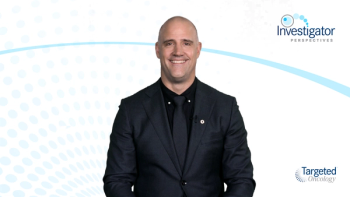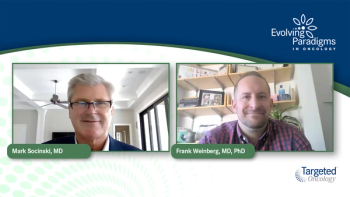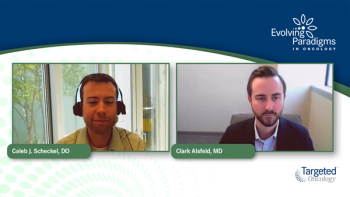
Looking Forward and Unmet Needs in Steroid-Refractory GVHD
Dr Yi-Bin Chen shares his thoughts on future directions and unmet needs in treatment of steroid-refractory GVHD.
Yi-Bin Chen, MD: Looking forward, we need to think about better ways to design studies for acute graft versus host disease (aGVHD). It is clear that not all patients are biologically alike, and there are some patients who are going to do well and others who are not. The ability to risk-stratify these patients and design trials using these methods of risk stratification will ultimately help improve the field. These biomarkers can ultimately perhaps help to steer patients toward one therapy or another if they can also be predictive of response. And that's the future. It's taking a population that's very heterogeneous like aGVHD, being able to risk stratify them based on some system and conduct such trials. In the discussions that we have had nationally, what we're looking is that patients who are low risk and who are going to do well, we can get away without steroids for these people and use other agents. A cooperative group trial already use sirolimus in this regard, and then recently a completed trial also used itacinib, which is a JAK1 (Janus kinase 1) inhibitor, and we'll see if we can replace steroids for a subset of the population or perhaps taper steroids even faster in such patients. For the high-risk patients, I'm not sure any of us think we can get away without steroids at the moment, and perhaps adding a drug to steroids. Maybe trying something like ruxolitinib, which is approved, or any of the other agents being studied, the question is, how do we advance in chronic graft versus host disease. There are some issues that are similar to acute in the sense that chronic graft versus host disease is a heterogeneous disease, both clinically and biologically. The world of biomarkers for chronic graft versus host disease is a bit behind that in acute. If we're able to develop some biomarkers that can help restratify again, those patients in the high risk vs low risk, or ultimately can predict which patient will respond to which therapy, these will be huge advances in the field. I mentioned agents that are already being studied for chronic graft versus host disease already. In addition to ruxolitinib, there's belumosudil, the ROCK (rho kinase) inhibitors, as well as a monoclonal antibody against the CSF1R (colony stimulating factor 1 receptor) that both target fibrosis. And we look forward to not only the results of these trials but possible approvals in the upcoming year. A lot of us who look at chronic graft versus host disease need to think about what we tell our patients, not only before transplant, but also once we start treatment. We need to frame the expectations of how long symptoms will be and what our expectations are, which inherently are to stop the progression first, and then to improve. We need to accept that once chronic graft versus host disease has set in, there is some element of organ irreversibility, and we need to acknowledge that to our patients. Looking at all the clinical trials in chronic graft versus host disease, responses in terms of complete responses are oftentimes in the single digits. And that isn't a realistic expectation and cannot be a realistic endpoint for this population, at least with the agents we have now. But looking forward, there's a lot of research going on in all phases of therapy, frontline, refractory, and prevention, and I'm just grateful to be a part of this. It's an exciting time for graft versus host disease. Progress is being made, and I look forward to the next few years. Thank you very much for your attention.
This transcript has been edited for clarity.








































